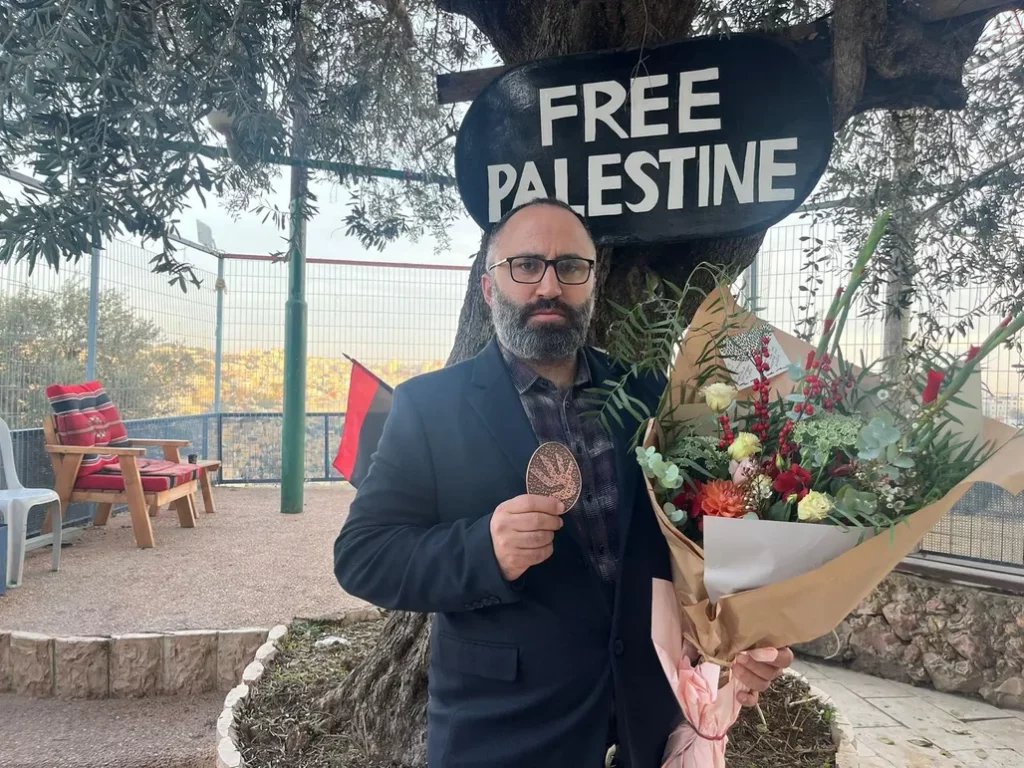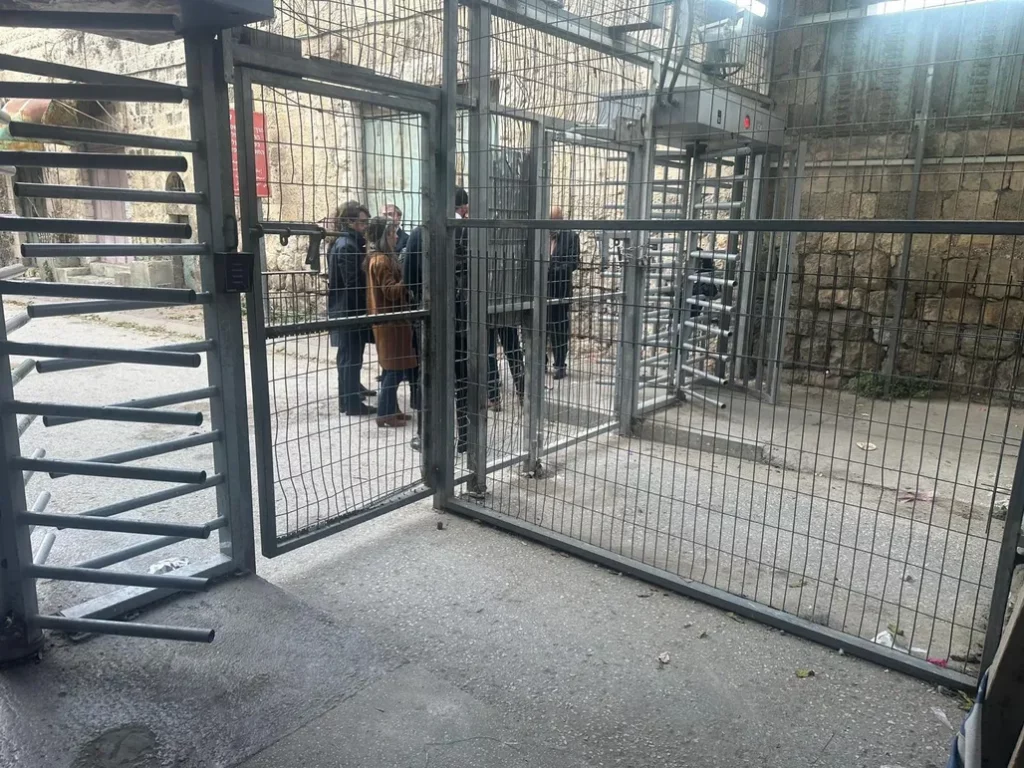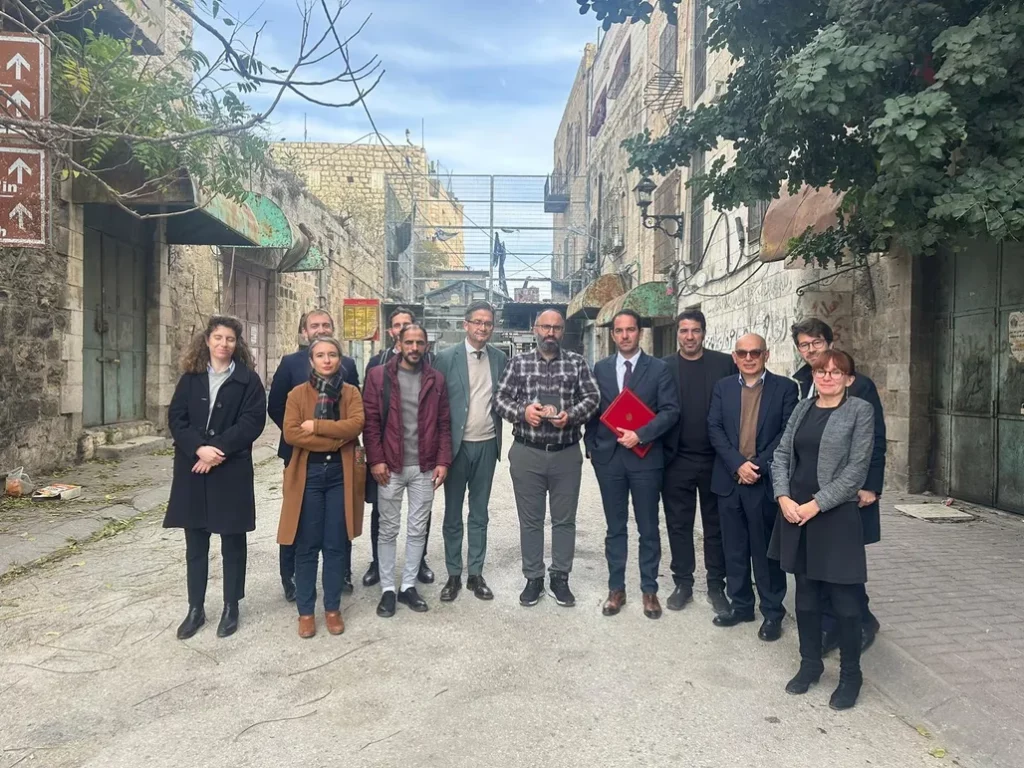Israeli laureate Maoz Inon accepted his Franco-German human rights prize in the French ambassador’s Tel Aviv residence, while Palestinian activist Issa Amro received his on the street outside an Israeli military checkpoint, calling it ‘a small taste of life under occupation’

Two activists, one Palestinian and one Israeli, have been named as this year’s laureates of the Franco-German Prize for Human Rights and the Rule of Law, an annual award jointly established by France and Germany which recognizes individual contributions to the fight for justice, equality, and freedom.
Maoz Inon, the Israeli laureate, received his award at the French ambassador’s residence in Tel Aviv. Palestinian activist Issa Amro had to accept his prize on a road outside an Israeli Defense Forces checkpoint.
French and German representatives, who had traveled to Hebron to present the award at Amro’s home, were denied entry into the city by Israeli soldiers. “Our thoughts are with Palestinians in Hebron who face this situation daily,” the French Consulate said in a statement.
Issa Amro is a Palestinian human rights defender who founded Youth Against Settlements, a grassroots organization built on his unwavering commitment to non-violent resistance against Israel’s occupation in the West Bank city of Hebron.
He is now the Executive Director of Friends of Hebron, a multi-country advocacy group which supports Palestinian freedom and self-determination.

Internationally, Amro’s efforts have earned him widespread recognition, but the response from the Israeli government has been far less positive.
Amro says he has been blacklisted from entering the country since 2009, when he worked with the Israeli human rights organization, B’Tselem. Since then, his request for entry permits are routinely denied, including the ones he needs to appear in court.
When Amro was told two weeks ago he would be receiving the Human Right and Rule of Law prize, he knew it would not be possible to attend an awards ceremony held inside Israel. “As a human rights defender, I am the enemy of the occupation,” Amro told Haaretz. “This is not about security, it’s punishment for the work I do.”
“I suggested to the committee that we hold a small ceremony at my home,” he explained. “We planned to share a meal, I wanted to invite our neighbors and a few Israeli friends who would be able to come.”
The delegation included the head of the German Representative Office to the Palestinian Authority, Oliver Owcza, and French Consul General Nicolas Kassianides. On Tuesday, when they arrived at the checkpoint to enter Hebron, they were denied entry by the IDF.

According to Amro, who came from his house to see if he could mediate, the soldiers did not provide a reason for the denial. “Even as I tried to explain to them that these were high-level diplomats, they refused to budge,” he said.
The entry denial was also corroborated by both Owcza and Kassianides and their offices, all of whom posted about the incident on their social media accounts. The German diplomat said he was “distressed by Israeli soldiers preventing us passing the checkpoint to Issa’s house!”
“Unacceptable,” Owcza continued, “and a reminder of the many movement restrictions Palestinians endure on a daily basis.”
In response to a request for comment regarding the incident at the checkpoint, an army spokesperson told Haaretz that the diplomats were not permitted to enter Hebron because such meetings must be authorized by the IDF in advance, which the delegation did not apply for.
The group made a quick decision to hold an impromptu ceremony on the street in front of the checkpoint instead. Amro was able to pass through the checkpoint to meet the delegation on the other side. “This is not exactly where we intended to do this,” Kassiaides began his remarks, “But our message today is an important one.
France will always stand on the side of human rights defenders. We will be on the side of those who fight for human rights and the rule of law. This is who Issa Amro is.”

Amro said he is thrilled to be recognized for the work he does, but cannot help but recognize the symbolism of being denied a proper celebration. “The diplomats now have just a small taste of what life is like for Palestinians living inside the occupation,” Amro pointed out.
“My hope is they will go back to their offices with this experience and demand that their countries work with us towards an end to the system that is literally killing Palestinians.”
Despite the difficulties of the day, Amro said in his acceptance speech that he is more optimistic than ever. “This prize gives me courage to defend my people’s rights,” he stated, “but it also tells me that peace is possible.”
“Now is the time to work together, to end the war in Gaza, to stop all human rights violations, and to put an end to exactly these kinds of obstacles that Palestinians face every day.”
“One day we will have freedom, we will have equality, and we will have peace,” he declared.
After Amro received his medal, the celebratory meal he originally planned to host was turned into an al-fresco dining experience as the group enjoyed Palestinian fare on the street, balancing their plates on giant concrete slabs in front of the checkpoint gates.
Israeli Laureat Maoz Inon has founded several tourism initiatives based on his long-held belief that tourism can be a powerful path to co-existence.

After Inon’s parents, Yakov and Bilha, were murdered by Hamas terrorists on October 7, rather than turn his back on the peace process, he doubled his efforts. Inon now travels around Israel and the world spreading his message of peace “not as a possibility, but an inevitability,” as he is fond of saying.
Germany’s Ambassador to Israel, Steffen Seibert, took to X with words of admiration for Inon, stating, “An honour and a pleasure to give the Franco-German Prize for Human Rights and Rule of Law to @maozinon – an inspiring man who reminds us that hope is action and peace for all must be the goal.”
During his acceptance speech, Inon called on those in the room to join the coalition he and others are working tirelessly to build even, or especially, during this period of great suffering.
“Stand with us,” he beseeched. “The peacebuilders, the NGOs, the civil societies, who, despite our pain, work every day to shape a future where no child or adult must endure what we have endured.”
“We ask not just for solidarity,” he continued, “but for courage—the courage to act now and to invest in civil society and peace.”
Inon also used his podium time to thank Amro, saying he felt privileged to share the award with him and that he had spoken to his co-recipient by phone to offer his congratulations.
“Though I have never met him,” Inon remarked, “I told him that we are partners, partners in a shared future that will be based on security and safety, equality and dignity, shared acknowledgement and recognition.”
Inon also acknowledged his fellow laureate’ absence from the ceremony. “I don’t even know what to call the reason he is not here,” Inon said. “Is it the occupation? Is it oppression? Or is it apartheid?” he asked. “It really doesn’t matter what we call it,” Inon declared. “It must be stopped.”
- Photo: Palestinian activist Issa Amro receives his prize, in Hebron.
